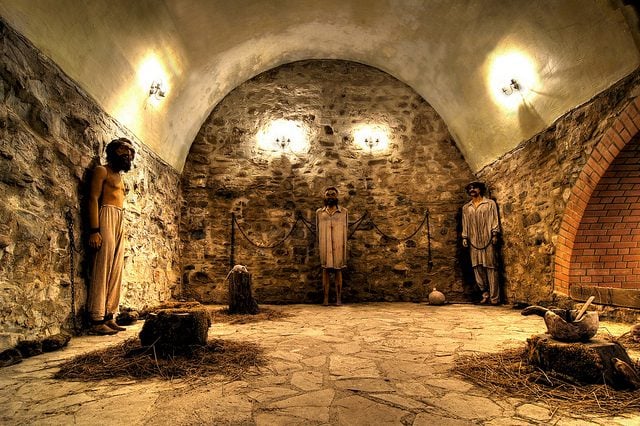Today, I’m excited to host my friend and fellow Episcopal priest Jonathan Myers as a guest film reviewer. We had planned to see this film together, but I unfortunately got sick the day before. I’m thrilled, in a way, because it means I get to share with you Jonathan’s provocative insights into the new DiCaprio film The Revenant.

When I walked out of a movie theater on a Wednesday afternoon after having the privilege of previewing The Revenant, I felt ill. Maybe it was the fact that my body only had coffee in it at that point, or maybe as I get a little older I’m becoming more sensitive to things I see. After taking some time to reflect on my experience of the film I am left wondering if the film was terrible or if it was so good that it had such a visceral impact on me.
A revenant in mythology and folklore is the reappearance of one who is dead, or assumed to be dead, for the purposes of haunting in some way the people connected to his or her life and death. They typical story deals with this phenomenon in apparitional or reanimation forms and usually has to do someone who was salty in nature while alive. (seehttps://en.wikipedia.org/wiki/Revenant)
Alejandro González Iñárritu casts Leonardo DiCaprio as Hugh Glass, an 1820’s scout on the ‘frontiers’ of the westward expansion of what we know of as America. I will be up front about my feelings on this film. I did not like it. There were a few occasions when I simply wanted to get up and walk out of the theater. I will say that film is at times beautiful and the expansiveness of the western part of North America is wonderfully captured. I didn’t know anything about the story before the film and I’m sure it makes a wonderful read in the novel. On film however, it is just too hard to watch, at least for an Enneagram Nine who is mostly over the idea of viewing gratuitous violence as entertainment.
You can read the synopsis of the film on IMDB, but the gist is Hugh Glass guides a team of hunters through the wilderness to trade furs and make money. Glass has only his survival instincts, understanding of the land, his son, and the memory of his wife, a Pawnee Indian, with him. Life is terribly difficult for them as the outsiders on the expedition, even though they are critical to it’s success. The story turns when Glass has an encounter with a grizzly and is left for dead by his men. His is a story of survival in the harshest of conditions with the only motive keeping him alive is exacting revenge on the man who becomes his arch enemy and his exact opposite in every way.
It is a classic revenge fantasy, which ultimately left Glass and this viewer unsatisfied and empty. It is an epic tale of survival to be sure. But the question I left the theater with was, “Survived for what?” He is utterly alone in the end, with nothing but a trail of blood, memories he will never shake, and the complete absence of those he loved most. He does not even have one friend. Nobody he is connected to makes it to the end of the film alive. In some ways the story becomes almost cartoonish because there is no way a human being could endure as much as he did in two and a half hours. Of course that is the beauty of the story as well.
The viewer must suspend any normal sense of time with incredible intentionality and endure what would’ve taken weeks or months to happen in just about a ninety minute span of time at the end of the film. I found it terribly insensitive of those involved with the making of the film to expect a human being to suffer as much grotesque physical and emotional violence as I did watching what Hugh Glass went through. It begs the question, “Are all stories meant to be shared visually?” An epic and potentially inspiring story like this is valuable to be sure, but is it actually beneficial on any level to actually watch someone’s interpretation of it? A story this intense deserves to be savored and allowed to work in someone’s mind and heart. This story in film format does not allow for that kind of time and space.
I’m aware that I do not possess the knowledge or training to write a review as a film critic. I am a particular personality type, with particular commitments philosophically, ethically, and religiously. I know that the feelings I had leaving the theater and that continue to stir within me have more to do with me than the film. For me, it wasn’t a good film to watch and I wouldn’t encourage most people to go see it. DiCaprio’s performance is garnering praise, which may be deserving, because at times I completely forgot I was watching a film. Most of the time I felt like I was his companion on his journey and I felt like the man on the screen was Hugh Glass and not a famous actor that many woman and men croon over. So in that sense, his performance is excellent. My issues with the film go above to more systemic questions of the value of watching grotesquely violent revenge fantasy and its impact on the human person who lives in a violent, xenophobic, and fearful world.
My only hope I am left with after having seen this film is that the viewer will understand better that complete emptiness that comes with exacting revenge. To see the protagonist at the end is left unsatisfied, alone, and still grieving after having finally killed the man who had wronged him throughout the film, is a dystopic experience. I can only hope that others will feel the same way and come one step closer to realizing that an ‘eye for an eye’ is not a value system worth our time and energy.
Visit Jonathan’s blog http://www.jonathanmyers.net.
Image Credit: Dave Bloggs 007/Flickr C.C.
This post is brought to you by my generous patrons, including Kyle Henshaw, Roseanna Goodman, Chris Wickersham.
Please consider supporting my work by becoming a patron, too, —at even just $1 a month— through Patreon. Thanks for reading. Thanks for sharing. Thanks for your support. It means more than you could know.











